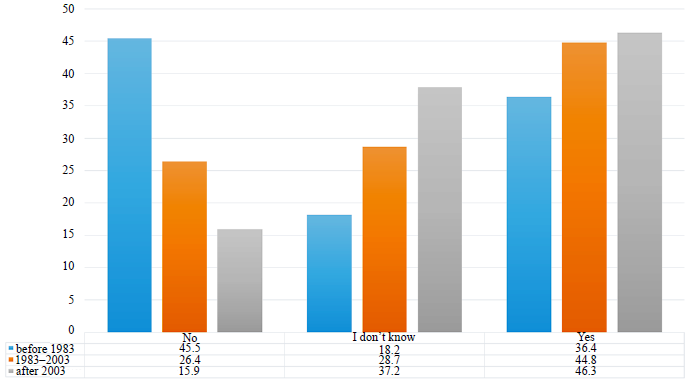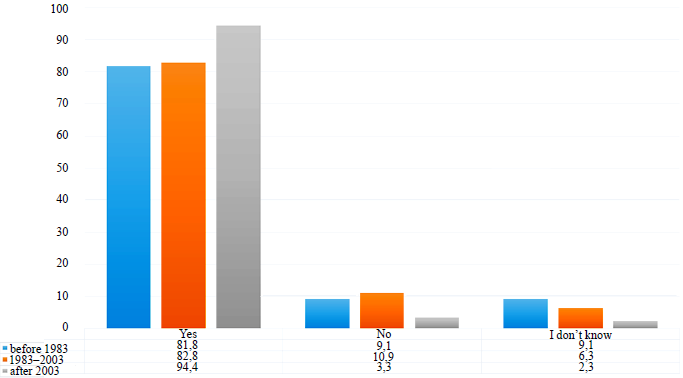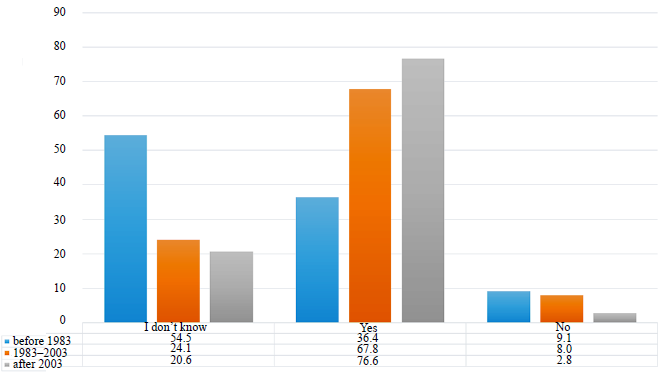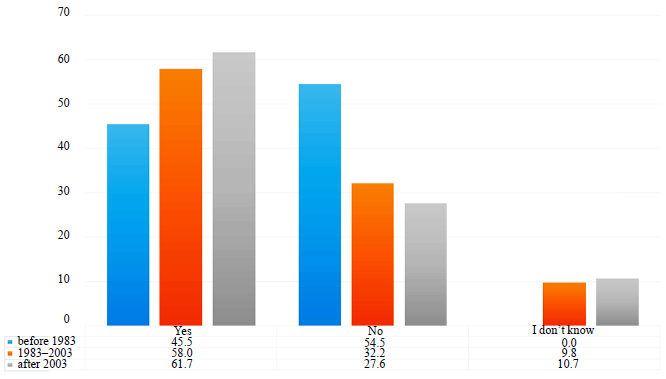Scroll to:
Transformations of the Value Paradigm in the Digital Age
https://doi.org/10.23947/2414-1143-2024-10-2-7-12
Abstract
Introduction. The article is devoted to the acute socio-philosophical issue ‒ the transformation of axiosphere of modern society, which has gained special relevance at present due to changes in the conditions of socialization, the paradigm shift in the perception of technical devices, the changing lifestyle of the “digital generation”.
Materials and methods. The complexity of the methods applied in the study is explained by the problematic of the work, extrapolating the methodology of philosophy and sociology. The theoretical and methodological basis is the concepts of R. Inglehart, A. Maslow, N. Howe and U. Strauss. The object of the study is the specifics of the transformation of the value paradigm of the “digital generation”, since today there is a convergence of values with needs, the perception of terminal values as instrumental values. It is hypothesized that in the conditions of information society and widespread digitalization, the “digital generation” has undergone a transformation of the sense of existential security, which is ambiguous, since the loss of traditional moral and ethical guidelines and spiritual alienation is possible.
Results. The necessity of periodic axiological analysis of the “digital generation” is emphasized, outlining specific markers for identifying patterns of social development and transformation of value dominants of the “digital generation”. It is pointed out that when introducing modified versions of modern technologies and the latest digital technologies into the publicly accessible information space, one should not forget about social, psychological, axiological control, endtoend analytics and the consequences of implementation, especially in terms of the qualitative outcomes of the entire process of socialization of the “digital generation”.
Discussion and conclusion. In the course of the research, the level of existential security of the “digital generation” was determined. The markers of identity, fulfillment, and fullness have been specifically identified, allowing to identify the points of feeling and perception of existential security of the “digital generation” at the current stage of development of the information society.
Keywords
For citations:
Zubareva S.S., Morgunov V.V., Shestakova I.G. Transformations of the Value Paradigm in the Digital Age. Science Almanac of Black Sea Region Countries. 2024;10(2):7-12. https://doi.org/10.23947/2414-1143-2024-10-2-7-12
Introduction. The transformations observed in the axiosphere of the information society at the modern stage of development have determined the transformation of not only the value paradigm, but also the conditions of socialization, the paradigm of perception of technical devices, and the lifestyle of a generation characterized by a high level of involvement in information and communication technologies and information and technological processes. “Digital generation” is at the forefront of discoveries not only in the field of modern branches of science, rapidly developing in line with digitalization, but also existential changes. The observed changes, primarily in the social sphere, but occurring everywhere due to the high-speed and high-tech development of the infrastructure surrounding modern man, are so radical that they need socio-philosophical comprehension of the impact on a small social group, which is the project of the future in the present.
The phenomena we observe today are unprecedented and illustrate the rapid transformation of the environment. In the literature one can find descriptions of social fractures that have changed the course of history and analyze their consequences for the individual in society such as, for example, the transformation of worldview and motivation due to a fundamental difference in the conditions of socialization. Two problems can be found in the description of this situation: the intergenerational gap and the change of values from materialistic to post-materialistic.
The logically arising question concerning the conditions of observing this social transformation as a kind of experiment by researchers is solved thoroughly, but in two different ways. On the one hand, they conduct an interdisciplinary analysis of the impact of phenomena and conditions of processes that determine constructive or destructive vectors of socialization and professionalization in the digital society [1]. On the other hand, they observe individual representatives of a certain socio-demographic group, inviting them for interviews at regular intervals to trace changes in their lives in the context of social and political events.
In this paper, the analysis of the transformation of the value paradigm in the digital age will be carried out on the basis of observations of the level of existential security of the socio-demographic group formed in the changed conditions of socialization, the inherent paradigm shift in the perception of technical devices, and the atypical lifestyle of the “digital generation”.
Materials and methods. In this study, the methodology takes a complex character due to the specifics of the research problems, as well as research traditions of axiological analysis. The theoretical and methodological basis of the study was formed by the concept of postmaterialism of R. Inglehart, the theory of generations of N. Howe and U. Strauss, the theory of needs of A. Maslow. The theory of generations by Hove-Strauss is of particular interest due to the fact that it has enriched the idea of differences between the population not only by demographic characteristics, but also by existential ones [2]. N. Howe and W. Strauss emphasized the existential experience that was received by a certain socio-demographic group at a particular stage of its development and assimilated as certain values, attitudes, beliefs, value orientations. The reference to the existential as a key basic element is also present in R. Inglehart, who associates large-scale sociocultural transformations, including axiological ones, with it [3‒5]. The web service “Google Forms” was used as a collection tool; to analyze the obtained results were uploaded to an XLS file for further automated processing using the author’s program code implemented in the modern programming language Python.
Results. In the course of the study, representatives of three different generations, differentiated according to Howe-Strauss’ generational theory — “Generation X” or the “Unknown Generation” (1963‒1983), “Generation Y” or the “Millennium Generation” (1983‒2003), and “Generation Z” or the “Digital Generation” (2003 — present) were interviewed. The research interest was aimed at determining the level of existential security of the “digital generation” in comparison with generations formed outside of digital conditioning. The research task was to formulate existential markers of identity, fulfillment, and fullness that would allow us to correctly identify patterns of development of individual small social groups and discover interrelationships between meaning and structural elements affecting social development. In order to solve this task, four questions were formulated, which, as it seems, will illustrate the current state of the problem: “Do you experience a sense of existential security?”, “Do you feel part of any community (family, colleagues, classmates, etc.)?”, “Do people around you approve of your decisions and actions?”, “Do you experience fear of not being able to realize yourself in the future?”.
R. Inglehart thought about the sense of existential security in the context of changing conditions in which a person exists. It is undeniable that digitalization can be considered as changed conditions of human existence, continuing the research traditions [6]. Information and communication technologies simplify a number of processes in the life of society by automating many functions, on the one hand. On the other hand, firstly, they threaten the privacy of private life, secondly, as researchers record, they have a particularly strong impact on the environment, thirdly, they have many social, economic, environmental and/or other consequences [7‒8]. In this regard, the existential perception of security of the generation formed in the conditions of digitalization is of particular interest.
The answers of respondents to the question “Do you experience a sense of existential security?”, presented in the form of a diagram in Figure 1, allowed us to determine that 36.4 % of representatives of “generation X” do not experience a sense of vulnerability to existential challenges. The feeling of confidence in this question is found in 44.8 % of representatives of “Unknown generation” and 46.3 % of representatives of “Generation Z”. As can be seen, the level of existential security shows the highest value in the “digital generation”.

Fig. 1. Respondents’ answers to the question “Do you experience a sense of existential security?”
The question naturally arises as to what may be the reason for the observed situation — we assume that it is the subjective feeling of belonging. In this connection the respondents were asked the following question “Do you feel yourself a part of any community (family, colleagues, classmates, etc.)?”.
It seems that it is the subjective feeling of belonging to a community that can become a barrier that can prevent the establishment of a sense of existential security, and sometimes, as scientists believe, make it almost impossible [9].
Respondents’ answers to this question, presented in the form of a diagram in Fig. 2, allowed us to determine that the absolute majority of respondents — representatives of all three generations — admitted that they feel part of their family, professional community and a group of like-minded people. At the same time, it should be noted that it is “Generation Z”, to a greater extent — 94.4 % — that feels a sense of belonging and involvement, only 3.3 % of representatives of the “digital generation” did not find such feelings in themselves and 2.3 % of them found it difficult to answer.

Fig. 2. Answers of respondents to the question “Do you feel yourself a part of any community (family, colleagues, classmates, etc.)?”
The results confirmed the hypothesis put forward and at the same time served as a prerequisite for forming the idea of what may be the reason for the approval of such feelings — we assume that it is the approval of the decisions and actions of the digital generation by others. This is due to the fact that, according to the results of generalized studies, the values of “trust” and “support” occupy the highest positions in the system of values of the “digital generation” [10‒11]. In this regard, the respondents were asked the following question “Do people around you approve of your decisions and actions?”.
The respondents’ answers to this question, presented in the form of a diagram in Figure 3, allowed us to determine that 76.6 % of the representatives of the “Digital generation” are sure that people around them (family, friends, colleagues, like-minded people) approve of their decisions and actions. It is also observed that this generation has the lowest number of answers among the undecided, only 2.8 %. Also, 67.8 % of representatives of “Generation Y” and 36.4 % of respondents among “Unknown generation” believe that people around them approve of their decisions and actions.

Fig. 3. Respondents’ answers to the question “Do people around you approve of your decisions and actions?”
The findings aroused research interest in the implications of the observed phenomena for the future of the «digital generation», namely the possibility of self-actualization of the “digital generation” in the future, in the conditions of technological singularity — in this regard, the respondents were asked the following question “Do you experience fear of the lack of opportunity to realize themselves in the future?”.
The respondents’ answers to this question, presented in the form of a diagram in Figure 4, allowed us to determine that there are no undecideds among the respondents of “Generation X”. 54.5 % have no doubts about the possibility to realize themselves in the future in various spheres in the conditions of technological singularity. At the same time, younger sociodemographic groups that have been socialized in the conditions of digitalization: “Generation Y” and “Generation Z” do not experience fear of the lack of opportunity to realize themselves in the future — in 32.2 % and 27.6 % of cases, respectively.

Fig. 4. Answers of respondents to the question “Do you experience fear of lack of opportunities to realize yourself in the future?”
Thus, in the course of the research we managed to identify the identification markers of identity, fulfillment and contentment in order to identify the regularities of social development and transformation of the value dominants of the «digital generation» in the information society. In addition, it is quite obvious that it is necessary to periodically conduct an axiological analysis of the “Digital generation” due to its vulnerability to indoctrination, realized, among other things, with the help of modern digital technologies. Digital technologies have a special meaning for the “Digital generation”, while the meanings transmitted by them are not always interpreted correctly by the “Digital generation”. In this regard, when introducing modified versions of modern technologies and the latest digital technologies into the publicly accessible information space, one should not forget about social, psychological, axiological control, end-to-end analytics and the consequences of implementation, especially in terms of the qualitative results of the entire process of socialization of the “Digital generation”.
Discussion and conclusion. As the main conclusions of the study, let us note the following. First, the introduction of both meanings, images and ideas, as well as the latest and modified technologies into the publicly available information space inevitably affects the conditions of socialization, the paradigm of perception of technical devices, and the lifestyle of the “digital generation”. The feeling and perception of the new social reality determines the decisions and actions of the “digital generation”, which in its present shapes the future of society as a whole. In this regard, the purpose of introducing a semantic or structural element should be obvious to society, otherwise existential threats may arise.
Secondly, confronting existential threats arising in the process of transformation of the value paradigm in the digital era is possible in the case of a sense of existential security based on tradition. In the case of the absence of a sense of existential security based on traditional values, or its assertion in the conditions of transitive reality and digital conditionality is contradictory in connection with the violation of the continuity between generations because it is based not on traditional ways of its formation, but on ephemeral ones, the verification of which, due to their novelty, has not yet been made.
Thirdly, the existential markers of identity, fulfillment and fullness allow us to identify the points of feeling and perception of existential security of the «digital generation» at the current stage of development of the information society.
The approach proposed in this study will make it possible to correctly identify patterns of development of individual small social groups and discover interrelationships between meaning and structural elements affecting social development.
References
1. Baeva L.V., Khrapov S.A., Grigorev A.V., Bibarsov D.A. Virtual Gamification and Problems of Students’ Social Interaction. Galactica Media: Journal of Media Studies. 2022;3:237–248.
2. Howe E., Strauss W. The fourth turning: What the cycles of history tell us about America’s next rendezvous with destiny. N.Y.: Crown. 2009. 400 p.
3. Inglehart R. Cultural evolution. Cambridge: Cambridge University Press. 2019. 291 p.
4. Inglehart R. Culture shift in advanced industrial society. Princeton: Princeton University Press. 2018. 504 p.
5. Inglehart R. Modernization and Postmodernization: cultural, economic, and political change in 43 societies. Princeton: Princeton University Press. 2020. 452 p.
6. Savin-Baden M., Burden D. Digital immortality and virtual humans. Postdigital Science and Education. 2018;1(1):123.
7. Shestakova I., Bylieva D., Lobatyuk V. Shared Micromobility: Between Physical and Digital Reality. Sustainability. 2022;4:2467–2468.
8. Shestakova I., Polanski S. Digital Civilization and Problems of Cultural Diversity: Political Actors or Infocommunication Technologies. Advances in Social Science, Education and Humanities Research. 2018;289:412–417.
9. Tazapchiyan R.M., Ereshchenko M.V., Shapovalova E.Y., Rogacheva T.D. The success criterion of a communicative act. 5th International multidisciplinary scientific conference on social sciences and arts sgem. 2018;651–656.
10. Zubareva S. Socio-cultural identity of the digital generation in the 21st century: cultural and philosophical analysis. Lecture notes in networks and systems. 2020;131:960–968.
11. Zubareva S., Zubareva, E., Lemeshko G. Professional Development of IT Industry Specialists at the Workplace: Trends, Focus and Prospects. 3nd International Conference on Technology Enhanced Learning in Higher Education (TELE). 2023;41–44.
About the Authors
Svetlana S. ZubarevaRussian Federation
Vladimir V. Morgunov
Russian Federation
Irina G. Shestakova
Russian Federation
Review
For citations:
Zubareva S.S., Morgunov V.V., Shestakova I.G. Transformations of the Value Paradigm in the Digital Age. Science Almanac of Black Sea Region Countries. 2024;10(2):7-12. https://doi.org/10.23947/2414-1143-2024-10-2-7-12















